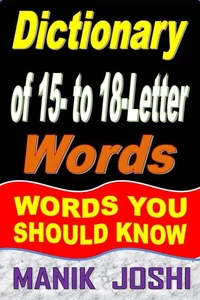How to Use the Word “Have” In English: A Comprehensive Guide to the Word “Have”. Words In Common Usage, #4
Par :Formats :
Disponible dans votre compte client Decitre ou Furet du Nord dès validation de votre commande. Le format ePub est :
- Compatible avec une lecture sur My Vivlio (smartphone, tablette, ordinateur)
- Compatible avec une lecture sur liseuses Vivlio
- Pour les liseuses autres que Vivlio, vous devez utiliser le logiciel Adobe Digital Edition. Non compatible avec la lecture sur les liseuses Kindle, Remarkable et Sony
 , qui est-ce ?
, qui est-ce ?Notre partenaire de plateforme de lecture numérique où vous retrouverez l'ensemble de vos ebooks gratuitement
Pour en savoir plus sur nos ebooks, consultez notre aide en ligne ici
- FormatePub
- ISBN978-1-005-89473-3
- EAN9781005894733
- Date de parution31/08/2021
- Protection num.pas de protection
- Infos supplémentairesepub
- ÉditeurC. C. Chamberlane
Résumé
This Book Covers The Following Topics:01. English Verb -- 'Have'02. Meanings of the Main Verb 'Have'03. Idioms With the Word 'Have'04. Phrasal Verbs With the Word 'Have'05. Proverbs/Sayings With the Word 'Have'06. Useful Expressions With the Word 'Have'07. English Word: 'Have' -- Useful Notes08. Conjugation of the Verb 'Have'Sample This:Have is an irregular verb. Its three forms are as follows:First Form (Base Form) - HAVE/HASSecond Form (Past Form) -- HADThird Form (Past Participle) -- HADPresent Perfect of 'Have' - HadPast Perfect of 'Have' -- Had-ING Form of 'Come' -- MakingInfinitive of 'Come' -- To HaveMOST COMMON Meanings OF "HAVE" AS A MAIN VERB ARE AS FOLLOWS:(Note: In some senses, you can also use "have got".
Especially in British English, using "have got" is quite popular.)Meaning 01:(have sth) (or have got sth) (not used in the continuous tenses) to hold, own or possess sthExample Sentences:He has an old two-wheeler. She does not have a college degree. They do not have an ATM card. Meaning 02:(have sth) to experience sthExample Sentence:What to do when you have a bad day at work. She had difficulty falling asleep and would wake up several times in the night.
My company has had a rapid economic recovery, He has had no adverse impact of the medicines. Our organization has had very healthy growth during the last yearShe was helpful to her friend who had a traumatic event. Many children have had neglect and abuse. He has had a truly remarkable year. Some sectors have had major financial challenges in recent years. The hill road had larger slips. Meaning 03:(have sth) (or have got sth) (not used in the continuous tenses) to have a thought or feeling in your mindShe has the notion that she can fulfill her dreams.
They have always had the belief that they could beat the big teams. I have got an idea for the event. She has got an idea for how it should work. Meaning 04:(have sth) (or have got sth) (not used in the continuous tenses) to show a particular feature or qualityExample Sentences:Most of the things we eat have flavor in them. He has a lot of confidence. He had the audacity to reject my suggestion for a superficial reason.
Meaning 05:(have sth) to eat, drink or smoke sthExample Sentences:I had a delicious meal at his home. He had a cigarette during her stroll', We all had breakfast together at 8 am. We all had lunch and took a picture. He had dinner with his family and then went to the office.
Especially in British English, using "have got" is quite popular.)Meaning 01:(have sth) (or have got sth) (not used in the continuous tenses) to hold, own or possess sthExample Sentences:He has an old two-wheeler. She does not have a college degree. They do not have an ATM card. Meaning 02:(have sth) to experience sthExample Sentence:What to do when you have a bad day at work. She had difficulty falling asleep and would wake up several times in the night.
My company has had a rapid economic recovery, He has had no adverse impact of the medicines. Our organization has had very healthy growth during the last yearShe was helpful to her friend who had a traumatic event. Many children have had neglect and abuse. He has had a truly remarkable year. Some sectors have had major financial challenges in recent years. The hill road had larger slips. Meaning 03:(have sth) (or have got sth) (not used in the continuous tenses) to have a thought or feeling in your mindShe has the notion that she can fulfill her dreams.
They have always had the belief that they could beat the big teams. I have got an idea for the event. She has got an idea for how it should work. Meaning 04:(have sth) (or have got sth) (not used in the continuous tenses) to show a particular feature or qualityExample Sentences:Most of the things we eat have flavor in them. He has a lot of confidence. He had the audacity to reject my suggestion for a superficial reason.
Meaning 05:(have sth) to eat, drink or smoke sthExample Sentences:I had a delicious meal at his home. He had a cigarette during her stroll', We all had breakfast together at 8 am. We all had lunch and took a picture. He had dinner with his family and then went to the office.
This Book Covers The Following Topics:01. English Verb -- 'Have'02. Meanings of the Main Verb 'Have'03. Idioms With the Word 'Have'04. Phrasal Verbs With the Word 'Have'05. Proverbs/Sayings With the Word 'Have'06. Useful Expressions With the Word 'Have'07. English Word: 'Have' -- Useful Notes08. Conjugation of the Verb 'Have'Sample This:Have is an irregular verb. Its three forms are as follows:First Form (Base Form) - HAVE/HASSecond Form (Past Form) -- HADThird Form (Past Participle) -- HADPresent Perfect of 'Have' - HadPast Perfect of 'Have' -- Had-ING Form of 'Come' -- MakingInfinitive of 'Come' -- To HaveMOST COMMON Meanings OF "HAVE" AS A MAIN VERB ARE AS FOLLOWS:(Note: In some senses, you can also use "have got".
Especially in British English, using "have got" is quite popular.)Meaning 01:(have sth) (or have got sth) (not used in the continuous tenses) to hold, own or possess sthExample Sentences:He has an old two-wheeler. She does not have a college degree. They do not have an ATM card. Meaning 02:(have sth) to experience sthExample Sentence:What to do when you have a bad day at work. She had difficulty falling asleep and would wake up several times in the night.
My company has had a rapid economic recovery, He has had no adverse impact of the medicines. Our organization has had very healthy growth during the last yearShe was helpful to her friend who had a traumatic event. Many children have had neglect and abuse. He has had a truly remarkable year. Some sectors have had major financial challenges in recent years. The hill road had larger slips. Meaning 03:(have sth) (or have got sth) (not used in the continuous tenses) to have a thought or feeling in your mindShe has the notion that she can fulfill her dreams.
They have always had the belief that they could beat the big teams. I have got an idea for the event. She has got an idea for how it should work. Meaning 04:(have sth) (or have got sth) (not used in the continuous tenses) to show a particular feature or qualityExample Sentences:Most of the things we eat have flavor in them. He has a lot of confidence. He had the audacity to reject my suggestion for a superficial reason.
Meaning 05:(have sth) to eat, drink or smoke sthExample Sentences:I had a delicious meal at his home. He had a cigarette during her stroll', We all had breakfast together at 8 am. We all had lunch and took a picture. He had dinner with his family and then went to the office.
Especially in British English, using "have got" is quite popular.)Meaning 01:(have sth) (or have got sth) (not used in the continuous tenses) to hold, own or possess sthExample Sentences:He has an old two-wheeler. She does not have a college degree. They do not have an ATM card. Meaning 02:(have sth) to experience sthExample Sentence:What to do when you have a bad day at work. She had difficulty falling asleep and would wake up several times in the night.
My company has had a rapid economic recovery, He has had no adverse impact of the medicines. Our organization has had very healthy growth during the last yearShe was helpful to her friend who had a traumatic event. Many children have had neglect and abuse. He has had a truly remarkable year. Some sectors have had major financial challenges in recent years. The hill road had larger slips. Meaning 03:(have sth) (or have got sth) (not used in the continuous tenses) to have a thought or feeling in your mindShe has the notion that she can fulfill her dreams.
They have always had the belief that they could beat the big teams. I have got an idea for the event. She has got an idea for how it should work. Meaning 04:(have sth) (or have got sth) (not used in the continuous tenses) to show a particular feature or qualityExample Sentences:Most of the things we eat have flavor in them. He has a lot of confidence. He had the audacity to reject my suggestion for a superficial reason.
Meaning 05:(have sth) to eat, drink or smoke sthExample Sentences:I had a delicious meal at his home. He had a cigarette during her stroll', We all had breakfast together at 8 am. We all had lunch and took a picture. He had dinner with his family and then went to the office.






















